Inspecting Townhomes in Tustin
2011 September 24 by Mark Ingraffia
Today, we would like to talk about the importance of maintaining the exterior features of your home. More times often than not, our home inspectors in Tustin run across issues that many homeowners fail to keep up. This applies to both people living in Single family residences and for those living in Townhomes. There is a common misconception for townhome owners that if repairs are needed in the “common” areas of the property, then the Association is responsible for these repairs. This is not necessarily true. The folks here at Ingraffia Home Inspections have compiled a simple, yet very important list of “common area” features that may be the responsibility of the homeowner.
Roofs
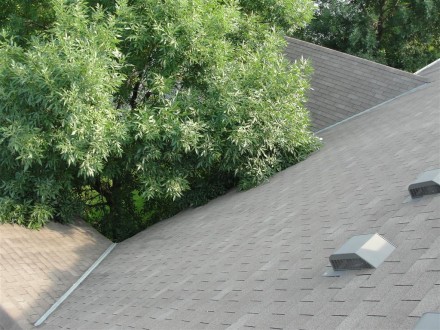 Roof defects are huge on townhouses. Many times, nobody knows about the defect yet, or in some cases, someone knew about a problem and made several unsuccessful attempts to repair it.
Roof defects are huge on townhouses. Many times, nobody knows about the defect yet, or in some cases, someone knew about a problem and made several unsuccessful attempts to repair it.
Tree branches should never touch roofs; they cause problems ranging from roof damage to allowing pests and vermin to gain easy access to crawlspaces, walls and vents. This is like leaving your door wide open for anyone to walk in.
Decks & Patios
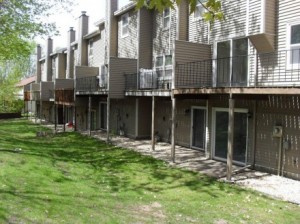 Home inspectors find more problems with decks than with any other component of a home. With townhouses, decks are often the sole responsibility of the homeowner; if you see a bunch of different decks in various states of repair, it’s usually a dead giveaway that the deck is the owner’s responsibility, not the association.
Home inspectors find more problems with decks than with any other component of a home. With townhouses, decks are often the sole responsibility of the homeowner; if you see a bunch of different decks in various states of repair, it’s usually a dead giveaway that the deck is the owner’s responsibility, not the association.
When all the decks look identical, it’s pretty safe to say that the decks are the responsibility of the association, but it’s still important to know that your deck was properly constructed and safe for use. An extremely common defect that I find on decks is improper nails used at the joist hangers; it doesn’t matter if it’s a townhouse or not. An improperly attached deck is the number one cause of deck collapses.
During your inspection, we will look for any missing nails, joist hangers, and anything that may look out of place. Don’t be the victim of an injury due to a poorly maintained deck.
Exterior Maintenance
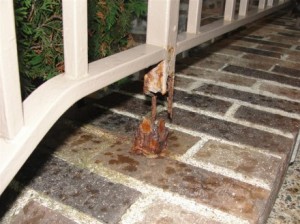 On townhouses, exterior maintenance is obviously the responsibility of the townhouse association, but again, is the association aware of the big projects that are going to cost a lot of money? If not, this means an assessment for the owners.
On townhouses, exterior maintenance is obviously the responsibility of the townhouse association, but again, is the association aware of the big projects that are going to cost a lot of money? If not, this means an assessment for the owners.
From inspecting rot and mold on wood retaining walls and fences to rusted and damaged metal railways and gates, allow Ingraffia Home Inspections to help assess and determine who should be responsible for these types of repairs.
In conclusion, the best thing you can do when living in a Townhome association is to be informed of your rights and know where your responsibilities lie for exterior repairs and maintenance. Also remember that an Association may not know about these needed repairs unless someone tells them. Avoid the costly repairs that you may be on the hook for and inform the proper personnel to bring immediate attention to the issues before someone can get hurt.
Smoke Detector Basics and Troubleshooting
2011 August 24 by Mark Ingraffia
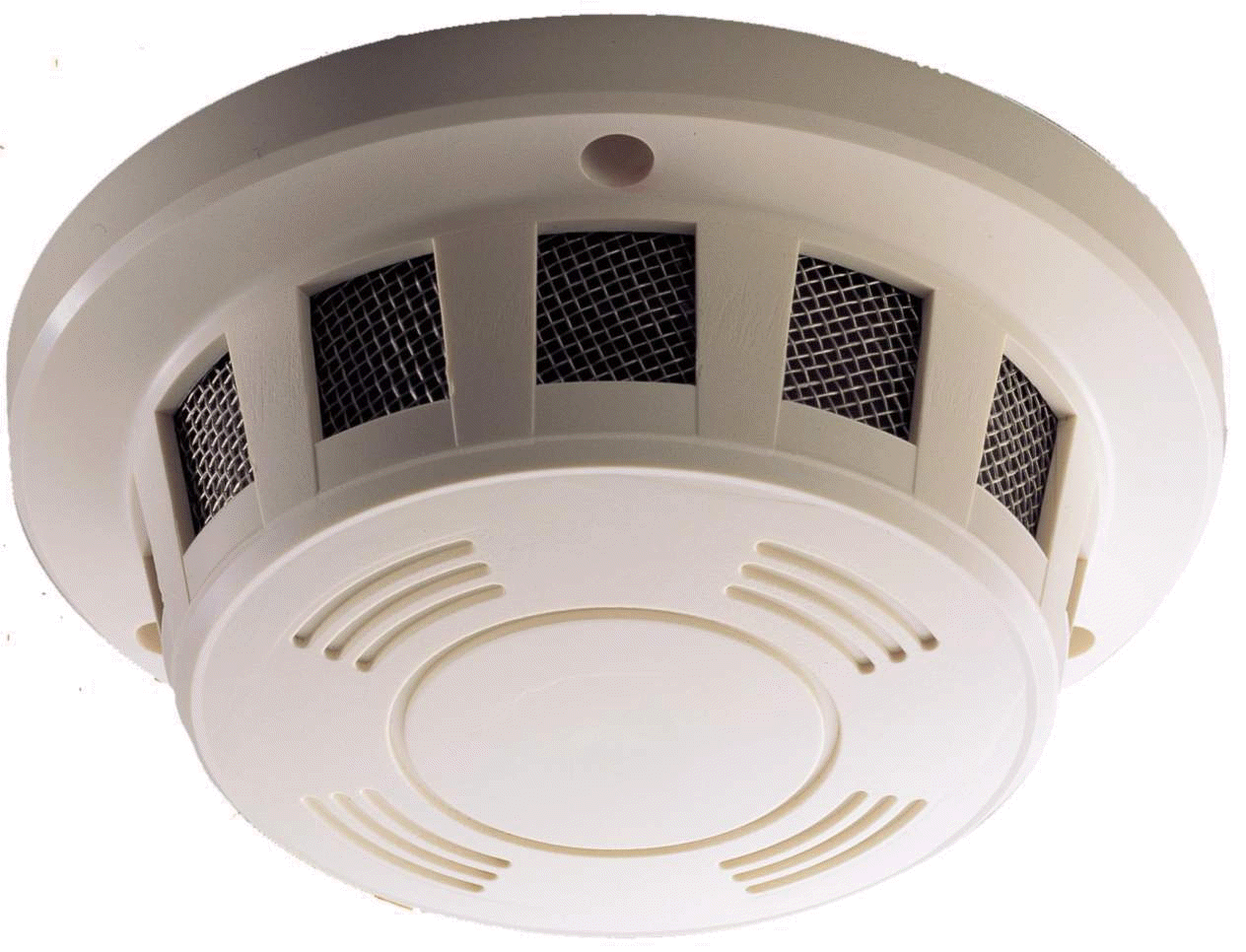 Every once in a while, Ingraffia Home Inspections likes to browse around the Internet and find interesting articles on subjects that a Home Inspector in a different area may have to deal with. Just recently, we ran across a well-written article regarding the importance of smoke detectors, so we thought we would share it with you. When you are ready for your home pre-purchase or pre-sale home inspection, do not hesitate to call us at (714) 371-8422.
Every once in a while, Ingraffia Home Inspections likes to browse around the Internet and find interesting articles on subjects that a Home Inspector in a different area may have to deal with. Just recently, we ran across a well-written article regarding the importance of smoke detectors, so we thought we would share it with you. When you are ready for your home pre-purchase or pre-sale home inspection, do not hesitate to call us at (714) 371-8422.
This article was written by an author named Josh on the InspectingPhoenix.com website. You may see the original article by clicking here, or you may read the article below.
“Smoke detectors are a vital safety feature that should be installed in every home; they save lives and protect property. Not only is it important to have enough properly located smoke detectors but they should also be properly maintained in accordance with the manufacturer’s instructions. A poorly maintained smoke detector can lead to nuisance alarms or an inoperable unit.
During the course of our home inspections we inspect the smoke detectors for proper operation. It is all too common to find missing or inoperative smoke detectors in people’s homes.
The National Fire Protection Association (NFPA) standards recommend:
- A smoke detector on every level of the home
- A smoke detector outside each sleeping area
- A smoke detector inside each bedroom
- Locate smoke detectors on ceiling at least 4 inches from the wall
- Locate smoke detectors high on a wall between 4 and 12 inches from the ceiling
- Interconnected smoke detectors that all sound when one alarms
- Use combination Ionization and Photoelectric smoke detectors
There are some areas that are not ideal to locate smoke detectors, avoiding these locations can reduce nuisance alarms and ensure your smoke detectors stay in proper working order longer. Below are some basic guidelines to use for proper placement of the smoke detectors:
- Try to locate smoke detectors at least 20 feet from appliances such as furnaces and ovens
- Locate alarms at least 10 feet from high humidity areas such as a shower
- Locate smoke detectors at least 3 feet from heating and air conditioning vents
Maintenance of your smoke detectors is very important to insure proper operation. Below are some general maintenance guidelines. Manufacturer’s instructions should always be followed.
- Replace batteries annually or when the smoke detectors start chirping
- Vacuum the smoke detector regularly using the soft brush attachment to prevent dirt buildup in the detection chamber. This will prevent nuisance alarms due to false indications.
Troubleshooting smoke detectors can require a little bit of trial and error, especially in interconnected systems. Following these steps should help in diagnosing and fixing the problem.
Chirping – Smoke detector emits a high pitch chirp about once a minute:
- Low battery – Smoke detectors typically chirp to indicate a low battery. In an interconnected system only the smoke detector with the low battery should chirp.
- Battery drawer open – If the battery drawer is not fully closed the batter will not make contact with the terminals. Ensure the battery drawer is fully closed.
- Battery pull tab not removed – New smoke detectors are shipped with a plastic pull tab between the battery and battery terminals to prevent operation. If this is left in place the smoke detector does not sense the battery and assumes it is dead. Remove the tab.
Nuisance Alarms – These are just a few of the things that can cause nuisance alarms. Unplugging a smoke detector due to nuisance alarms is dangerous and provides no protection in case of a fire.\
- Dust or dirt – If there is dust or dirt in the sensor chamber the smoke detector can sense this as smoke. You should vacuum the smoke detector with the soft brush attachment.
- Grease or cooking vapors – If the smoke detector is located in an area with cooking vapors, grease, combustion gasses or other contaminants the sensor chamber can develop a greasy film. This greasy film can cause the alarm to sound. Due to the difficulty of cleaning this film and the risk of damage to the smoke detector, I recommend you replace the smoke detector.
- Power interruption – In a hardwired smoke detector the alarm will sound briefly if the power is interrupted and then restored. Power interruptions can be caused by loose wire connections. Ensure that the wires are properly and securely connected. Use caution when working with hard wired smoke detectors as they are connected to the homes electrical system. Always ensure that the circuit breaker for the smoke detectors is off when working on this system. Call a qualified electrician if you do not feel comfortable working with electricity.
- Interconnected Alarm – In an interconnected alarm system if one smoke detector goes off all others will alarm making it difficult to diagnose. Every manufacturer is different but most have a way of indicating which smoke detector is initiating the alarm. Look at the lights on the detectors, usually the one initiating the alarm will have a flashing light during the alarm to let you know it is the one that sounded the alarm.
- Location – Ensure the smoke detector is not located near furnaces, ovens, showers or supply air vents. You may need to relocate a smoke detector if it is not in an ideal location.
- Replacement – Smoke detectors are fairly cheap. If you try everything else and cannot get the detector to stop going off try replacing the unit.
This is just a general guideline to help you with smoke detector location and troubleshooting, always follow the manufacturer’s recommendations and the NFPA guidelines when working with smoke detectors.”
The Weird Things You Find on a Home Inspection in Westminster
2011 August 23 by Mark Ingraffia
Being a home inspector isn’t always the most glamorous job available, but sometimes we run across items during an inspection that are an ultimate risk factor, dangerous, and sometimes down-right funny. We have searched the web to find a few examples (although I’m sure there are MANY more) of what NOT to accept as a “repair” from a local handyman, contractor or ANYONE you pay to work on your home. If your spouse is a DIY’er, make sure the repair does not wind up like these.
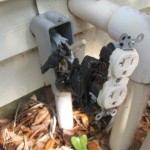 Whenever you are working with outdoor electricity, you must ensure that the wiring is properly covered. Using electrical tape to cover the wiring with caps to connect the lines is not a smart, or even legal way to connect an exterior plug. Even the receptacle itself is not the right grade.
Whenever you are working with outdoor electricity, you must ensure that the wiring is properly covered. Using electrical tape to cover the wiring with caps to connect the lines is not a smart, or even legal way to connect an exterior plug. Even the receptacle itself is not the right grade.
Note: when installing outdoor plug outlets, be sure they are GFI rated and are properly covered with a lid when not in use. Any exposure to water may cause significant damage to your electrical system and may even cause a fire.
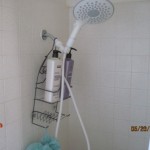 Look closely. Can you spot what’s wrong in this picture? Look closer. That’s it! Why on earth would there be an electrical outlet IN THE SHOWER? Other than being extremely dangerous, this is prohibited by building codes.
Look closely. Can you spot what’s wrong in this picture? Look closer. That’s it! Why on earth would there be an electrical outlet IN THE SHOWER? Other than being extremely dangerous, this is prohibited by building codes.
The best way to resolve this issue would be to re-route the outlet to outside of the shower stall, possibly on a neighboring wall that the wires currently share.
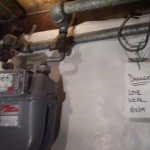 Having exposed LIVE electrical wiring is very dangerous to all occupants. Having a LIVE electrical wire next to your gas meter can be deadly. The slightest leak combined with an electrical surge can be devastating and can be an ututer disaster.
Having exposed LIVE electrical wiring is very dangerous to all occupants. Having a LIVE electrical wire next to your gas meter can be deadly. The slightest leak combined with an electrical surge can be devastating and can be an ututer disaster.
If at any time you see live, uncovered electrical wires, call a licensed and certified electrician immediately.
Ingraffia Home Inspections is dedicated to ensuring that your future home is completely safe and free from quick fixes that may cost you thousands of dollars in repairs later down the line. Call us today at (714) 371-8422 and let our home inspectors in Westminster save you from the local handyman who may be your worst nightmare.
Your Reliable Home Inspector in Lake Forest
2011 August 8 by Mark Ingraffia
 The home inspector you hire in Lake Forest says a lot about who you are. When you call on Ingraffia Home Inspections at (714) 371-8422, you will choose a company that is dedicated to providing you with the utmost home inspection service. For the better part of a decade, our technicians have been providing Orange County and the rest of Southern California with unsurpassed real estate inspections.
The home inspector you hire in Lake Forest says a lot about who you are. When you call on Ingraffia Home Inspections at (714) 371-8422, you will choose a company that is dedicated to providing you with the utmost home inspection service. For the better part of a decade, our technicians have been providing Orange County and the rest of Southern California with unsurpassed real estate inspections.
While most people choose to go with an inspection company that offers the lowest price, they may not always be getting the best deal. You’ve heard the slogan “You get what you pay for”, and the same goes for home inspection companies that offer a bid substantially lower than other companies. Unfortunately, many crucial items may be missed, including foundation cracks, mold and mildew, or even stress cracks in the home’s frame.
When IHI arrives at your home, we will look over the condition of your home’s foundation, structure and overall property, such as any pools, spas, and other mechanical equipment you may have. You can get a better idea of all of the services we offer and our pricing by visiting our Items Inspected page of our website, as well as our pricing page.
Ingraffia Home Inspections is very competitively priced in today’s market, and will ensure that we will find all of the areas of your home that need attention. So whether you are looking to purchase a home and want a pre-purchase inspection, or you are looking for a new home purchase inspection, we can help. Our staff is ready for your call to (714) 371-8422 and we want your home inspection in Lake Forest to be successful.
What Is A California Home Inspection? – (714) 371-8422
2011 March 23 by Mark Ingraffia
What’s a home inspection?
Many imagine that a house inspection is known as a process wherein every inch of the house is examined. No! It really is nothing like that. It is in fact a non-invasive approach in reviewing the state of the property. In truth, the review is limited. Then again, the individual conducting this or the home inspector is qualified to get all assignments completed as it should be. He also has tools to assist them evaluate the house. As soon as the review is finished, he prepares his meticulous report, comprising his evaluations, the possible complications that may occur in the house and his suggestions on what has to be done with the problem areas.
Continue reading »
Construction Oversight – Ingraffia Home Inspections – 714.371.8422
2011 March 8 by Mark Ingraffia
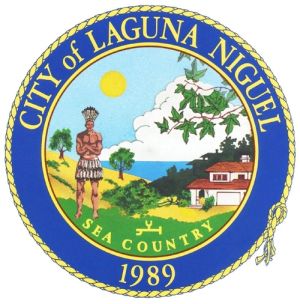
Often clients always wonder if they should spend the money on a home inspection in Laguna Niguel, CA for a newly built home. After all, shouldn’t a brand new home be perfect? We have two words for those clients: Construction Oversight.
Continue reading »
